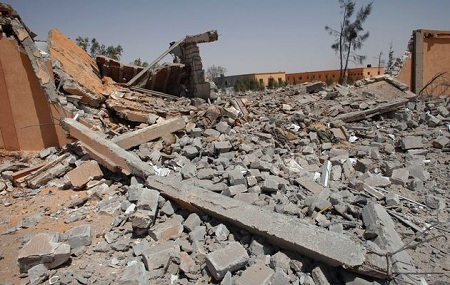Al Jazeera and agencies, May 28, 2012
Afghan family of eight killed in NATO airstrike
Afghan authorities say that at least eight members of a family have been killed after an airstrike by the US-led NATO coalition in the eastern province of Paktia.
The International Security Assistance Force (ISAF) coalition said it was aware of the allegation and was investigating the incident, which happened late on Saturday night.
A senior NATO official said that so far, there is no evidence of any civilian casualties. The official spoke on condition of anonymity because he was not authorized to disclose the information.
Rohullah Samon, a spokesman for the Paktia provincial government, said on Sunday that a man, a woman and their six children were killed in a coalition airstrike at 8pm local time (15:00 GMT) in Suri Khail village of Gurda Saria district.
"This man had no connection to the Taliban or any other terrorist group," Samon told the AFP news agency, naming the man as Mohammad Shafi.
"Shafi was not a Taliban. He was not in any opposition group against the government. He was a villager," Samon said. "Right now, we are working on this case to find out the ages of their children and how many of them are boys and girls."

The aftermath of airstrikes. (Photo: Bob Strong/Reuters)
Al Jazeera's Bernard Smith, reporting from Kabul, said that the issue of civilian casualties had remained a source of tension between the Afghan government and ISAF.
"If you ask NATO they'll say that they go to great lengths to make sure that the target they strike does not involve civilians. They rely on intelligence on the ground, they'll say, before these strikes are launched.
"I would also say that in fact the actions of the Taliban, planting a lot of homemade roadside bombs, kill far more civilians than foreign forces do," he said.
"But nevertheless when foreign forces cause death to civilians, it causes great political disquiet here in Afghanistan, and [Afghan President] Hamid Karzai has often complained about civilian deaths by foreign forces."
Karzai summoned General John Allen, the commander of ISAF, and Ryan Crocker, the US ambassador, to the presidential palace just over two weeks ago to warn that civilian deaths threatened relations. That meeting came after Afghan officials said that 18 civilians had been killed in recent airstrikes in Logar, Kapisa, Badghis and Helmand provinces.
"If the lives of Afghan people are not safe, the signing of the strategic partnership [between Afghanistan and the US] has no meaning," Karzai's office said earlier this month.
Four soldiers killed
Meanwhile, four NATO soldiers were killed in bomb blasts in the southern part of the country, ISAF said on Sunday.
The soldiers died "following separate improvised explosive device attacks" on Saturday, ISAF said in a statement, without providing further details or the nationalities of the victims.
The latest deaths take the toll for NATO troops this year to 169.
There are about 130,000 ISAF troops in Afghanistan, but they are all due to withdraw by the end of 2014. Some countries have already begun their troop pullouts.
The withdrawal will leave Afghan security forces to battle the Taliban, and many areas of the country remain insecure.
The Taliban have stepped up their attacks across the country since announcing the start of their spring offensive at the beginning of May.
Last year was the deadliest on record for civilians in the Afghan war, with 3,021 killed as insurgents ratcheted up violence with suicide attacks and roadside bombs, the United Nations said in its latest report on civilian deaths.
The UN attributed 77 per cent of the deaths to insurgent attacks and 14 per cent to actions by international and Afghan troops. Nine per cent of cases were classified as having an unknown cause.
Characters Count: 4571
